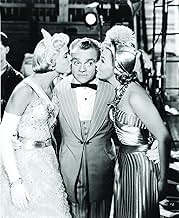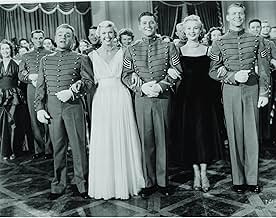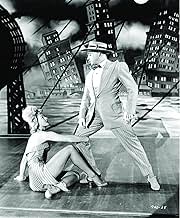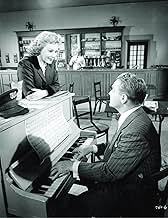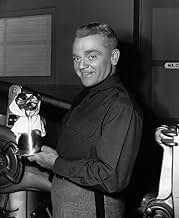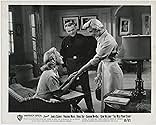AVALIAÇÃO DA IMDb
6,2/10
1,6 mil
SUA AVALIAÇÃO
Adicionar um enredo no seu idiomaA Broadway director helps the West Point cadets put on a show, aided by two lovely ladies and assorted complications.A Broadway director helps the West Point cadets put on a show, aided by two lovely ladies and assorted complications.A Broadway director helps the West Point cadets put on a show, aided by two lovely ladies and assorted complications.
- Direção
- Roteiristas
- Artistas
- Indicado a 1 Oscar
- 2 indicações no total
John Baer
- Young Cadet
- (não creditado)
DeWit Bishop
- Cadet
- (não creditado)
Jack Boyle Jr.
- Cadet in Show
- (não creditado)
Tex Brodus
- Cadet
- (não creditado)
Wheaton Chambers
- President's Secretary
- (não creditado)
Chuck Courtney
- Plebe
- (não creditado)
Paul Cristo
- Officer
- (não creditado)
Luther Crockett
- Senator
- (não creditado)
Avaliações em destaque
A shame really. With the talent, how could one go wrong with Doris Day, James Cagney, Gordon MacRae, Gene Nelson and Virginia Mayo, 'The West Point Story' could and should have been really good, even if not an instant classic.
Well something did go wrong, because 'The West Point Story' (despite being called 'Fine and Dandy' here, being British it is being referred to by its English, and original, title, just wanted to clarify to save any confusion) was a heavily problematic, lacklustre effort that doesn't even utilise its talent very well (even though they still come off well). Not an awful film, but not a particularly good one but more of a difficult to rate film for me.
The best thing about it is Cagney, who may not be exactly subtle (which came across to me as making the most out of, and doing at least something with, his material), but brings a tremendous amount of energy which is a marvel to watch. So much so that it makes one frustrated that that energy doesn't come over in most other elements. Day and MacRae also don't come off too shabbily. Day is fresh and endearing and one cannot get enough of her voice that shines even in not so great material. Meanwhile, MacRae shows off his warm baritone voice to perfection and is a charmer on screen, when he and Day are on screen they are irresistible.
Mayo and Nelson deserved better (as did Day and MacRae) but do a lot with what they have. Mayo is luminous, snappy and saucy, while Nelson's dancing is as dazzling as ever. The songs are pleasant enough and sung beautifully.
Against all that, of the songs there isn't one that stands out and it is crying out for a show-stopper. Likewise with having a show-stopper of a dancing sequence for Nelson, he dances really well and the choreography is witty and graceful but at the same time there is nothing extraordinary or memorable. As said though, Day and MacRae do sound wonderful and the songs suit their voices, one just wishes that the overall standard was more inspired.
Nothing against black and white (there is a very big group of great films and even masterpieces in black and white), but 'The West Point Story' also cried out for Technicolor. The sets do look shoestring-budget cheap with obvious rear projection and the cinematography is dull. Roy Del Ruth is the sort of director who could do this with his eyes closed and despite some energetic moments in some of the choreography elsewhere this was a real going through the motions effort from him.
Script goes overboard in the silliness and feels very limp too. Worst of all is the story, which is pedestrian in pace, takes silliness and contrivance to very high degrees and is filled with inconsistencies, dumbness and improbabilities, with very forced subplots and parts that don't really go anywhere. Day is also rather underused with a character that is given short shrift too much.
Overall, very difficult to rate but generally very disappointing. 5/10 Bethany Cox
Well something did go wrong, because 'The West Point Story' (despite being called 'Fine and Dandy' here, being British it is being referred to by its English, and original, title, just wanted to clarify to save any confusion) was a heavily problematic, lacklustre effort that doesn't even utilise its talent very well (even though they still come off well). Not an awful film, but not a particularly good one but more of a difficult to rate film for me.
The best thing about it is Cagney, who may not be exactly subtle (which came across to me as making the most out of, and doing at least something with, his material), but brings a tremendous amount of energy which is a marvel to watch. So much so that it makes one frustrated that that energy doesn't come over in most other elements. Day and MacRae also don't come off too shabbily. Day is fresh and endearing and one cannot get enough of her voice that shines even in not so great material. Meanwhile, MacRae shows off his warm baritone voice to perfection and is a charmer on screen, when he and Day are on screen they are irresistible.
Mayo and Nelson deserved better (as did Day and MacRae) but do a lot with what they have. Mayo is luminous, snappy and saucy, while Nelson's dancing is as dazzling as ever. The songs are pleasant enough and sung beautifully.
Against all that, of the songs there isn't one that stands out and it is crying out for a show-stopper. Likewise with having a show-stopper of a dancing sequence for Nelson, he dances really well and the choreography is witty and graceful but at the same time there is nothing extraordinary or memorable. As said though, Day and MacRae do sound wonderful and the songs suit their voices, one just wishes that the overall standard was more inspired.
Nothing against black and white (there is a very big group of great films and even masterpieces in black and white), but 'The West Point Story' also cried out for Technicolor. The sets do look shoestring-budget cheap with obvious rear projection and the cinematography is dull. Roy Del Ruth is the sort of director who could do this with his eyes closed and despite some energetic moments in some of the choreography elsewhere this was a real going through the motions effort from him.
Script goes overboard in the silliness and feels very limp too. Worst of all is the story, which is pedestrian in pace, takes silliness and contrivance to very high degrees and is filled with inconsistencies, dumbness and improbabilities, with very forced subplots and parts that don't really go anywhere. Day is also rather underused with a character that is given short shrift too much.
Overall, very difficult to rate but generally very disappointing. 5/10 Bethany Cox
James Cagney wrote in his autobiography that the only films he watched in his retirement years continually were the musical ones. He regretted he didn't do more of them. So do I, so should we all.
While The West Point Story isn't the greatest film Cagney ever did at Warner Brothers, it's far from the worst and I find it charming and entertaining.
This was his second film with Virginia Mayo and quite a contrast it was after White Heat. The lovely Ms. Mayo also got to show what a good dancer she was both with Cagney and Gene Nelson.
The singing is carried in this film by Doris Day and Gordon MacRae. Usually folks don't think of Gordon MacRae as Doris's most frequent leading man, but in fact he did four films with her. He had a wonderful baritone voice and he could easily adapt to light musical fare like The West Point Story or do operetta like The Desert Song which he did a few years later. It's too bad for MacRae that he did not come along 20 years earlier and could have done a few of those operettas the way Nelson Eddy did.
Gene Nelson was a fine dancer who when musicals went out of vogue, turned to directing. Another talented performer who came along a little too late. He never got the credit for being the fine dancer he was.
The plot is simple, James Cagney and Virginia Mayo once a good pair of top choreographers are reduced to seedy nightclub work. Cagney gets an opportunity to go to West Point to help put on the annual 100th night show the graduating class does. The catch is he has to try to lure Gordon MacRae to the bright lights of Broadway for his producer uncle Roland Winters. From there the plot evolves.
And it's a nice story with good musical numbers even though Jule Styne and Sammy Cahn got no hits out of the score. Still the songs are well integrated into the plot.
I think people will enjoy watching The West Point Story.
While The West Point Story isn't the greatest film Cagney ever did at Warner Brothers, it's far from the worst and I find it charming and entertaining.
This was his second film with Virginia Mayo and quite a contrast it was after White Heat. The lovely Ms. Mayo also got to show what a good dancer she was both with Cagney and Gene Nelson.
The singing is carried in this film by Doris Day and Gordon MacRae. Usually folks don't think of Gordon MacRae as Doris's most frequent leading man, but in fact he did four films with her. He had a wonderful baritone voice and he could easily adapt to light musical fare like The West Point Story or do operetta like The Desert Song which he did a few years later. It's too bad for MacRae that he did not come along 20 years earlier and could have done a few of those operettas the way Nelson Eddy did.
Gene Nelson was a fine dancer who when musicals went out of vogue, turned to directing. Another talented performer who came along a little too late. He never got the credit for being the fine dancer he was.
The plot is simple, James Cagney and Virginia Mayo once a good pair of top choreographers are reduced to seedy nightclub work. Cagney gets an opportunity to go to West Point to help put on the annual 100th night show the graduating class does. The catch is he has to try to lure Gordon MacRae to the bright lights of Broadway for his producer uncle Roland Winters. From there the plot evolves.
And it's a nice story with good musical numbers even though Jule Styne and Sammy Cahn got no hits out of the score. Still the songs are well integrated into the plot.
I think people will enjoy watching The West Point Story.
Next to "Yankee Doodle Dandy", this has Cagney's best dancing. It also has some fine dancing and singing from Virginia Mayo, Doris Day, Gordon MacRae & Gene Nelson. They all do very well, along with an early funny performance by Alan Hale Jr.
Shot in Technicolor, with better songs and more plausible story, this could have been another "The Bandwagon".
Cagney's role is similar to his role in the earlier musical 'Footloght Parade'. As in "Footlight", at one point, one of the dancers is unable to go on and Cagney's character fills in for him. Virginia Mayo plays the same sort of wise-cracking sexy blonde that Joan Blondell played in "Footlight".
The main main plot is Cagney being pressured into joining West Point to help them put on a musical. Adding to that implausibility is a cadet (Gordon MacRae) with a magnificent voice preferring to make a career in the Army, even after falling in love with a famous singing star (Doris Day basically playing herself).
The romance between Cagney and Mayo isn't so far fetched when you look at the movies Fred Astaire made with Leslie Caron, Audrey Hepburn and others. Virginia Mayo displays a fine dancing talent and lovely singing voice, and Doris Day shows she could dance as well as sing. I wish they'd left out the long patriotic number with Gordon MacRae and let him sing a ballad or duet with Doris. Gene Nelson is totally wasted here; they really didn't let him have a big dance number like his Kansas City number in "Oklahoma!" The movie would have been improved had there been an estrangement between Mayo and Cagney with perhaps a dalliance between Mayo and Nelson sparking jealousy in Cagney.
Even though Cagney is noticeably heavier here than in "Yankee Doodle Dandy", he still dances very well and delivers a comic performance complete with facial mugging and explosive tantrums. Those tantrums with lots of hopping up and down like a Warner Bros. cartoon character couldn't have been good for Cagney's 50 year old knees! Alan Hale Jr. was quite funny especially when his huge bulk is next to the short statured Cagney. Warner's should have made some sort of police comedy buddy movie with Hale and Cagney.
I enjoyed seeing Cagney and Mayo once again playing totally different parts. They play off each other very well as do Cagney and Day. It's obvious that MacRae and Day look so cute together that they just had to make more movies together with better songs. Cagney was sufficiently impressed with Doris Day that he pushed for her to get the Ruth Etting part in "Love Me Or Leave Me".
Shot in Technicolor, with better songs and more plausible story, this could have been another "The Bandwagon".
Cagney's role is similar to his role in the earlier musical 'Footloght Parade'. As in "Footlight", at one point, one of the dancers is unable to go on and Cagney's character fills in for him. Virginia Mayo plays the same sort of wise-cracking sexy blonde that Joan Blondell played in "Footlight".
The main main plot is Cagney being pressured into joining West Point to help them put on a musical. Adding to that implausibility is a cadet (Gordon MacRae) with a magnificent voice preferring to make a career in the Army, even after falling in love with a famous singing star (Doris Day basically playing herself).
The romance between Cagney and Mayo isn't so far fetched when you look at the movies Fred Astaire made with Leslie Caron, Audrey Hepburn and others. Virginia Mayo displays a fine dancing talent and lovely singing voice, and Doris Day shows she could dance as well as sing. I wish they'd left out the long patriotic number with Gordon MacRae and let him sing a ballad or duet with Doris. Gene Nelson is totally wasted here; they really didn't let him have a big dance number like his Kansas City number in "Oklahoma!" The movie would have been improved had there been an estrangement between Mayo and Cagney with perhaps a dalliance between Mayo and Nelson sparking jealousy in Cagney.
Even though Cagney is noticeably heavier here than in "Yankee Doodle Dandy", he still dances very well and delivers a comic performance complete with facial mugging and explosive tantrums. Those tantrums with lots of hopping up and down like a Warner Bros. cartoon character couldn't have been good for Cagney's 50 year old knees! Alan Hale Jr. was quite funny especially when his huge bulk is next to the short statured Cagney. Warner's should have made some sort of police comedy buddy movie with Hale and Cagney.
I enjoyed seeing Cagney and Mayo once again playing totally different parts. They play off each other very well as do Cagney and Day. It's obvious that MacRae and Day look so cute together that they just had to make more movies together with better songs. Cagney was sufficiently impressed with Doris Day that he pushed for her to get the Ruth Etting part in "Love Me Or Leave Me".
When previewing a performance for the musical show being put on, Cagney says "Wouldn't hiss, wouldn't cheer." That about sums it up perfectly, except that I am hissing - some. This movie musical about Cagney helping West Point cadets put on a musical revue, simply just lays there. Despite his energetic presence and the talents of Doris Day, Gordon MacRae, Gene Nelson, and Virginia Mayo, it comes across as lifeless. The musical numbers are upbeat and Cagney uses his whole body to show disgust for incompetent amateurs (if you've seen it, you know what I mean,) but the songs are not original or grand enough to really stand out. It may seem pleasant enough at the time, but after nearly two hours, you feel worn out. See another Doris Day or James Cagney film first.
James Cagney really gives his all (and that's plenty of talent) to the role of a rambunctious song-and-dance man who takes over a show at West Point, with the help of a talented cast including Virginia Mayo, Doris Day, Gordon MacRae and Gene Nelson. Cagney struts around getting angry and defiant as only he can, bringing lots of much needed life to a tiresome script. It's one of his best as a song-and-dance man, making one wish he had done even more musical films.
But this one could have used Technicolor and a wittier script with better songs. All of the talent cannot overcome the story's limitations and the overuse of rear projection photography for many of the outdoor scenes. Alan Hale, Jr. gets some good chuckles out of his "Princess" role and there's a light-heartiness about the whole film that keeps it entertaining enough for the most part.
Doris Day is missing from the first third of the movie, but once she shows up she demonstrates why she became such a cheerful Warner Bros. star. She and Gordon MacRae do nicely by a couple of forgettable songs.
Summing up: Worth seeing for Cagney alone. He's in fine shape for some energetic dance routines.
But this one could have used Technicolor and a wittier script with better songs. All of the talent cannot overcome the story's limitations and the overuse of rear projection photography for many of the outdoor scenes. Alan Hale, Jr. gets some good chuckles out of his "Princess" role and there's a light-heartiness about the whole film that keeps it entertaining enough for the most part.
Doris Day is missing from the first third of the movie, but once she shows up she demonstrates why she became such a cheerful Warner Bros. star. She and Gordon MacRae do nicely by a couple of forgettable songs.
Summing up: Worth seeing for Cagney alone. He's in fine shape for some energetic dance routines.
Você sabia?
- CuriosidadesThe year she made this, Doris Day also made her first appearance in the Quigley Top 25 Box Office Stars poll, placing at #24. She would remain on the list every year until she retired from making movies in 1968, and was ranked #1 four times in the early 1960s.
- Erros de gravaçãoAt last minute, Jan (a female movie star) makes a surprise appearance in a role in an all-male West Point revue, in a part everyone assumed was to be played by a man. But a few minutes later there's a photo of her in closeup in the program featuring stars of the production.
- Citações
Eve Dillon: You heel! Can't even pay a hotel bill! In debt up to your ears, and it's horses! Horses every second you're awake! Horses, horses, horses!
Elwin 'Bix' Bixby: [unapologetically] I don't drink or smoke.
- ConexõesFeatured in Biografias: Doris Day: It's Magic (1998)
- Trilhas sonorasAlma Mater
(uncredited)
Music by Friedrich Kücken (song Treue Liebe)
Lyrics by Paul S. Reinecke
Sung by a chorus during the opening credits
Principais escolhas
Faça login para avaliar e ver a lista de recomendações personalizadas
- How long is The West Point Story?Fornecido pela Alexa
Detalhes
- Data de lançamento
- País de origem
- Idiomas
- Também conhecido como
- The West Point Story
- Locações de filme
- Empresa de produção
- Consulte mais créditos da empresa na IMDbPro
- Tempo de duração
- 1 h 47 min(107 min)
- Cor
- Proporção
- 1.33 : 1
Contribua para esta página
Sugerir uma alteração ou adicionar conteúdo ausente


